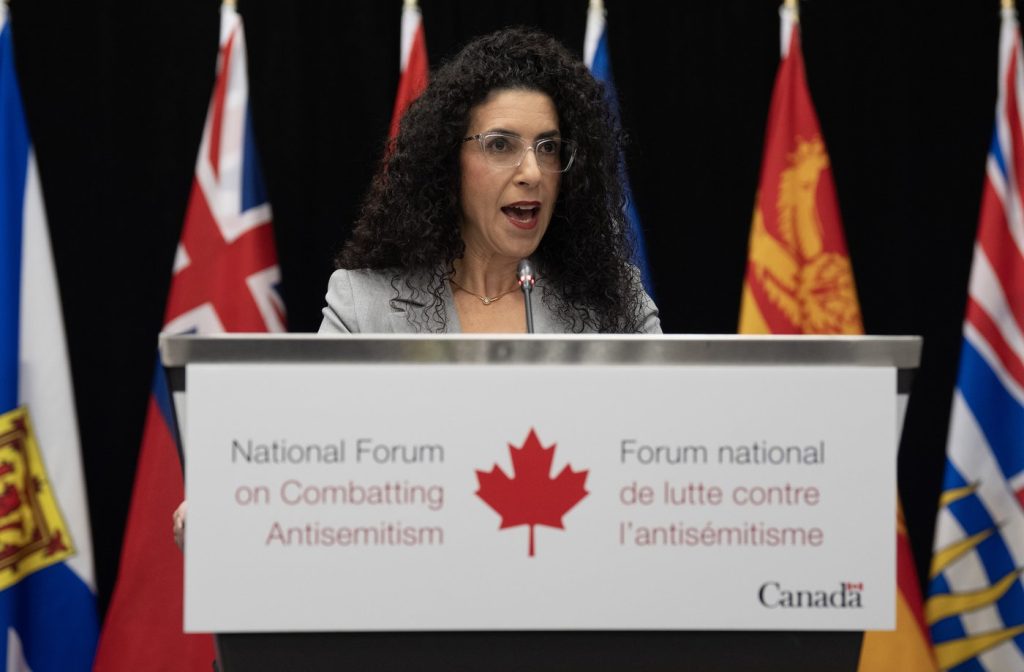After an outgoing federal envoy criticized certain politicians for using antisemitism as a "partisan" tool, Jewish Canadian leaders are urging political parties to avoid exploiting this sensitive issue for political gain. Richard Robertson, head of B'nai Brith advocacy, expressed his frustration, stating that it is maddening when Holocaust Remembrance Day is used to promote positive actions for the Jewish community, as it leads to tokenization.
In June, Deborah Lyons resigned from her position as Canada's special envoy on preserving Holocaust remembrance and combating antisemitism, and her final report, published in July, accused political leaders of leveraging the threat of antisemitism for political gains. She emphasized that Canadian political parties should not make antisemitism a partisan matter, warning that using the suffering of affected communities for political advantage is a severe breach of civic duty.
Lyons noted that the annual Holocaust commemoration events in Ottawa have become tainted with partisan politics. She called for the National Holocaust Remembrance Day to remain apolitical, urging for senior-level attendance that focuses on the day’s essence.
While Lyons did not specify the parties or politicians exploiting antisemitism in her report, Jewish groups have their own observations. Noah Shack, head of the Centre for Israel and Jewish Affairs, criticized the New Democratic Party (NDP) for abandoning its commitment to combat antisemitism, which he finds troubling. Robertson echoed this sentiment, pointing out that discussions around Palestinian statehood and an arms embargo on Israel fail to clarify that Canadian Jews are not responsible for the actions of foreign governments.
Robertson indicated that the rhetoric from political parties often distracts from the solemnity of Holocaust remembrance. He cited instances when federal Liberals highlighted governmental spending on security measures for synagogues during speeches at commemoration events, or when Conservative leaders attributed the rise in hate crimes to the government’s policies.
Liberal MP Rachel Bendayan, speaking on behalf of then-prime minister Justin Trudeau, discussed government initiatives related to Holocaust remembrance at this year's Ottawa ceremony, while Conservative Leader Pierre Poilievre criticized the government for its handling of hate crimes and groups associated with Iran. Robertson stated that such political rhetoric detracts from the opportunity for remembrance and reflection inherent in the day. He lamented that politicians often view antisemitism through a partisan lens, aiming to garner votes instead of promoting a unified front against hate.
Shack acknowledged that while it is unrealistic to expect politicians to entirely set aside politics, they can show solidarity with the Jewish community without exploiting the issue. He emphasized that politicians should represent their core values while ensuring that their messaging stands in solidarity with the fight against antisemitism, particularly as polls reveal an alarming number of young Canadians questioning the history of the Holocaust.
Lawrence Greenspon, co-chair of the National Holocaust Monument Committee, disagreed with those who believe the commemorative events have become overly politicized. He argued that political leaders have a responsibility to address current issues, stating that violence and discrimination are precursors to the kind of horror witnessed during the Holocaust.
Greenspon stressed that politicians owe it to Canadians to communicate their measures to prevent "pre-Holocaust type incidents," including the necessity of being cautious in their discourse regarding the Israel-Hamas conflict. His co-chair, Joel Diener, pointed out the absence of Bloc Québécois Leader Yves-François Blanchet and former NDP leader Jagmeet Singh from recent commemorative events, suggesting that their non-attendance politicizes the observances. Singh and Blanchet had not directly responded to inquiries about their attendance at memorials.
Diener expressed that Lyons should have specifically named names in her report instead of relying on Jewish groups to address this critical issue. Both Lyons and Jewish advocates claim that making connections between conflicts in the Middle East and Canadian Jews inadvertently incites intimidation and harassment.
Shack underscored the broader implications, stating that if Jewish Canadians' rights are threatened, it jeopardizes the rights of all Canadians. He emphasized the need for a collective stance against antisemitism. The growing concerns from both advocacy groups and political leaders highlight the delicate nature of addressing antisemitism in political discourse.











